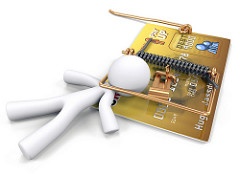Making the decision to enroll in a Debt Settlement Program brings a whole lot of different things to prepare for and get comfortable with.
After 15 years of helping people manage their debt issues, let me share with you some things that will really help!

People decide to enroll in a Debt Management Program such as Debt Settlement after a careful examination of their individual financial and personal situation. We always carefully walk our potential clients through their various options to make sure they choose the best one for them.
Although there could be many other reasons, most people have experienced one or more of the following:
- Unemployment for too long a time
- Divorce
- Major accident or illness
- Death of spouse or partner
- Retired with too little income
- Disability
Again, many people turn to the easily available credit of a credit card, pay day loan, or some other "quick fix" solution with the intention of paying these off as soon as things turn around.
I can't remember anyone that sought our help that had just foolishly spent and spent and spent and now was not able to keep up. I'm sure that happens, but that's not the normal Debt Settlement Client.
So here you are...
Several unsecured accounts (may also include medical bills and judgments) where the minimum monthly payment is just too large for the current income you have coming in.
Let me walk you through the basic process of the Debt Settlement Program:
When you miss (or start missing) the minimum payments due on your credit accounts, you most likely will get a letter or even a phone call from your creditor.
At first, they seem pleasant and willing to work with you, but as time goes by, their attitude and tactics change.
Now the letters seem very "threatening" and "demeaning" and the phone calls keep coming more often.
When a creditor calls, don't forget that the caller has been trained to say and do whatever they can (hopefully within the laws of the Fair Debt Collection Practices Act) to get you to start making payments again.
If you are not in a position to get caught up on your outstanding/delinquent debts, then I advise that you just ignore the call (learn to use caller ID!) or just hang up if you pick up by mistake.
I know this sounds harsh, and some other Debt Settlement Companies my suggest that you try to explain your situation, but years and years of working with people deal with debt collectors has taught me that is is usually a waste of time!
Oh, and by-the-way, as long as your account is still with the original creditor, they have the legal right to call you. Now, they are not supposed to call every hour or so and they are limited to the times of day, but at this point, I still advise that you just ignore them for now. (I'll show you how to put a stop to them just a little later.)
So, what's next?
After a while, maybe 3-4 months of this, your accounts will most likely be charged off and/or assianged or sold to a debt collection agency or debt buying agency.
"Charged off" means that the creditor is going to claim that they could not collect on this debt and they will "write it off" as a loss for their annual tax reporting.
TIME OUT...
About 99% of our clients ask, "What's this going to do to my credit?"
There is some great information about how your credit report and credit scores work. I'll give you a summary here, but it would be well worth your time to visit this site: MyFico.com
I know you are concerned about your credit score, but at this point, by being late, having too much debt and using too much debt, your credit scores are going to go down (if they haven't already).
The fact that you have gotten "in over your head" credit use wise, but, have taken the steps to do something about it (like debt settlement), will in the long run improve your scores.
Right now, the goal of the debt settlement probram is to help you avoid wage or bank garnishments due to judgments and/or avoid being forced to seek bankruptcy protection from your creditors.
Once you/we have successfully negotiate all of your accounts to a $0 balance, your credit score will improve.
Having your account "assigned" or "sold" to a collection agency, sounds very bad, but actually, for your debt settlement program, it is good.
Once your account(s) have been turned over to a collection agency, the negotiation process really starts.
Now we can demand/put a stop to the calls. I do this for my clients, but you can do this yourself.
Here's how:
Now, once in a while the orgingal creditor may send you letter stating that they would be willing to settle you account for such-n-such, but not very often.
If you get such a letter, be sure to forward it to the Debt Settlement Company right away as they may be able to get an even greater reducion/settlement for you!
Here's a good place to explain what your responsibility is while enrolled in a settlement program:
- Don't speak with the crediors or debt collectors as this actually hinders your negotiator in reaching good settlements.
- While your account is with the original creditor (Visa, Home Depot, etc.), you really don't need to send every monthly statement. One about every 3 months is fine.
- But, when the account is transferred to a debt collector, you need to scan or fax the most recent letters you receive each month. This is VERY IMPORTANT! I have had many client's fail to send me very good offers until a couple of months after receiving them. When I called on the offer, the account had been recalled by the creditor and now we have missed a very good opportunity.
How settlements are negotiated:
You've been making deposits/contributions into your Reserve Account help by an FDIC bank through your Debt Settlement Company for a few months now.
Obviously you don't have enough built up to settle all of you accounts, but your negotiator will try and negotiate a settlement with the company that is willing to give you the best settlement.
Most debt settlement companies will not make offers for settlements until they have a very large lump sum of money to offer. However, I have found that fair settlements can be negotiated and paid out over several months at now additional interest.
After the settlement has been completed:
Once the terms of the settlement have been completed, the debt collection company will send a letter of statement stating such.
They are supposed to send update information about this account to the 3 major credit bureaus (Experian, Equifax and TransUnion), but about half the time they don't!
I have our clients wait about 2-3 months after the settlement has been completed to request an Credit Report on themselves. It's not difficult and it can be FREE.
The law allows for each of us to request and receive a credit report on ourselves annually.
For a FREE copy (no scores) go to www.annualcreditreport.com.
You will asked a few security related questions, but should be able to get your credit report without too much effort.
You can get a more detailed report including your credit score from a number of sites, such as:
Credit Karma or several other sites
If you find errors, ie. they have not been updated since the settlement was completed, you can open a DISPUTE and in most cases, the error will be corrected in 30 days or so.
So, in a nutshell, that's how a debt settlement program works.
If you have questions or would like to learn more, let us know:





 If you have ever shopped around for car insurance, you probably already know that there are a number of factors that affect the rates you will be paying. Age, experience, and the type of vehicle you drive all seem like reasonable criteria, but what about your credit score? Whether you are aware of it or not, your credit rating in most cases does affect your insurance rates; knowing your credit rating and what it means for your rates makes it easier for you to get the best deal.
If you have ever shopped around for car insurance, you probably already know that there are a number of factors that affect the rates you will be paying. Age, experience, and the type of vehicle you drive all seem like reasonable criteria, but what about your credit score? Whether you are aware of it or not, your credit rating in most cases does affect your insurance rates; knowing your credit rating and what it means for your rates makes it easier for you to get the best deal.


